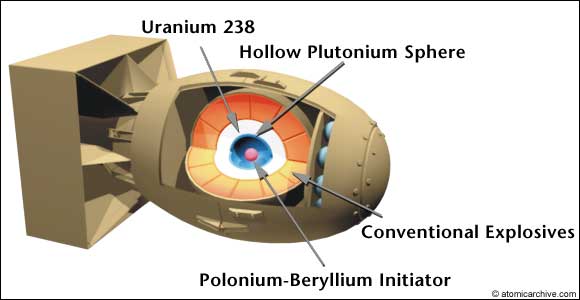The Hammer
Has No Life - Lives on TB
75 years ago today, in 1945, it was the beginning of the end of the most horrific conflict the world has (yet) seen.
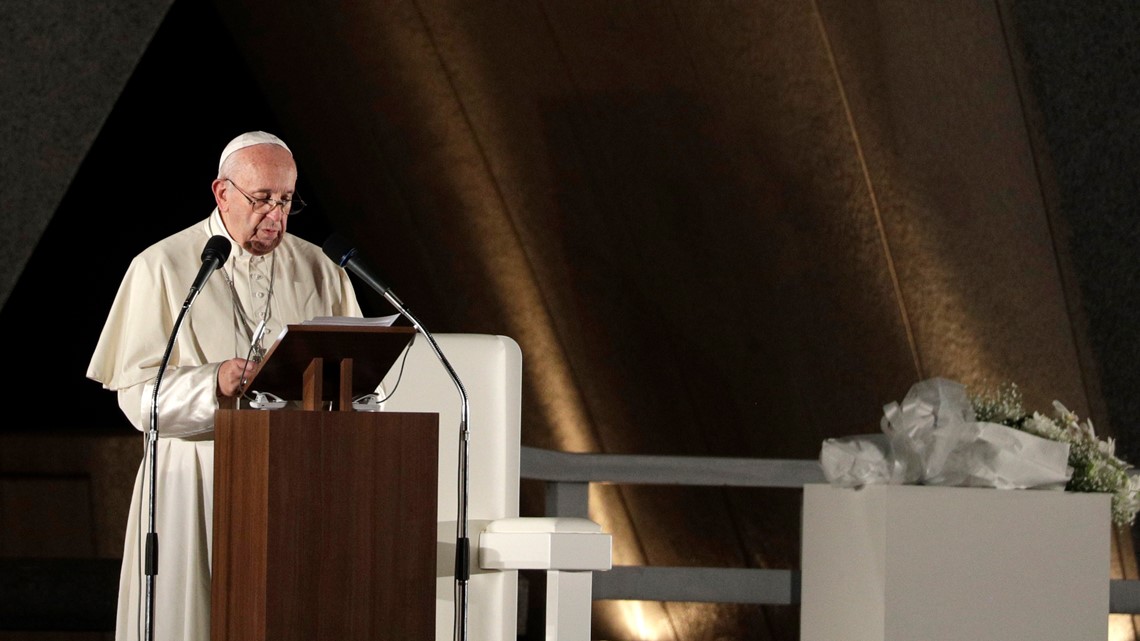

There's more at the link, including the less savory side of the mine and the damage it's done to the Congo over the decades since then.The Shinkolobwe mine – named after a kind of boiled apple that would leave a burn if squeezed – was the source for nearly all of the uranium used in the Manhattan Project, culminating with the construction of the atomic bombs dropped on Japan in 1945.
. . .
The story of Shinkolobwe began when a rich seam of uranium was discovered there in 1915, while the Congo was under colonial rule by Belgium. There was little demand for uranium back then: its mineral form is known as pitchblende, from a German phrase describing it as a worthless rock. Instead, the land was mined by the Belgian company Union Minière for its traces of radium, a valuable element that had been recently isolated by Marie and Pierre Curie.
It was only when nuclear fission was discovered in 1938 that the potential of uranium became apparent. After hearing about the discovery, Albert Einstein immediately wrote to US president Franklin D Roosevelt, advising him that the element could be used to generate a colossal amount of energy – even to construct powerful bombs. In 1942, US military strategists decided to buy as much uranium as they could to pursue what became known as the Manhattan Project. And while mines existed in Colorado and Canada, nowhere in the world had as much uranium as the Congo.
“The geology of Shinkolobwe is described as a freak of nature,” says Tom Zoellner, who visited Shinkolobwe in the course of writing Uranium – War, Energy, and the Rock that Shaped the World. “In no other mine could you see a purer concentration of uranium. Nothing like it has ever been found.”
Mines in the US and Canada were considered a “good” prospect if they could yield ore with 0.03% uranium. At Shinkolobwe, ores typically yielded 65% uranium. The waste pile of rock deemed too poor quality to bother processing, known as tailings, contained 20% uranium.
In a deal with Union Minière – negotiated by the British, who owned a 30% interest in the company – the US secured 1,200 tonnes of Congolese uranium, which was stockpiled on Staten Island, US, and an additional 3,000 tonnes that was stored above ground at the mine in Shinkolobwe. But it was not enough. US Army engineers were dispatched to drain the mine, which had fallen into disuse, and bring it back into production.
Under Belgian rule, Congolese workers toiled day and night in the open pit, sending hundreds of tonnes of uranium ore to the US every month. “Shinkolobwe decided who would be the next leader of the world,” says Mombilo. “Everything started there.”
All of this was carried out under a blanket of secrecy, so as not to alert Axis powers about the existence of the Manhattan Project. Shinkolobwe was erased from maps, and spies sent to the region to sow deliberate disinformation about what was taking place there. Uranium was referred to as “gems”, or simply “raw material”. The word Shinkolobwe was never to be uttered.
This secrecy was maintained long after the end of the war. “Efforts were made to give the message that the uranium came from Canada, as a way of deflecting attention away from the Congo,” says Williams. The effort was so thorough, she says, that the belief the atomic bombs were built with Canadian uranium persists to this day.
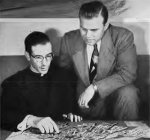

 www.bluearmy.com
www.bluearmy.com

I was told that the US didn't strike a Purple Heart until we started fighting in the ME.The story I got when I shipped out was that if I got wounded, I'd be getting a purple heart that had been made in anticipation of the number of casualties that would have occurred had we invaded the main island.
Not true.I was told that the US didn't strike a Purple Heart until we started fighting in the ME.
never heard this account before. Is it an absolute truth?This has been said by multiple people over the years, myself included. It was not necessary to nuke Japan. That country was already reaching out to the US to sue for peace. They had only one condition: to allow the Emperor to remain in office as a figurehead. America refused. Had we agreed, the war would have ended immediately. But the US needed to demonstrate to the Soviet Union that we had a terrible weapon. That demonstration was Hiroshima and Nagasaki. Naturally, upon the detonation of those two devices, the war was immediately over. The demonstration duly noted in the USSR. The Japanese surrender was unconditional.
In the end, the US allowed the Emperor to remain in office as a figurehead.
So how many hundreds of thousands of people had to die on the altar of realpolitik? THAT'S the "immorality" of using the bomb. There never would have been an invasion required. Japan was already beaten. So what was the point of killing all those people, and irradiating tens-of-thousands more?
I don't expect you slavering war lovers to understand or accept what I just wrote. But there is much evidence documenting what I said. Those people died so we could show the USSR that we had a bigger dick.
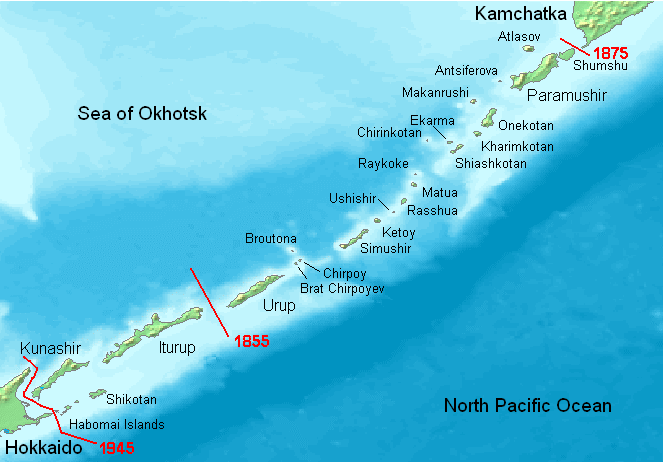


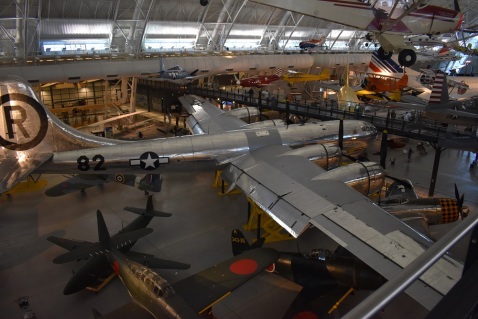
Fleet Admiral Chester W. Nimitz, Commander in Chief of the Pacific Fleet stated in a public address given at the Washington Monument on October 5, 1945:
The Japanese had, in fact, already sued for peace before the atomic age was announced to the world with the destruction of Hiroshima and before the Russian entry into the war. . . . [Nimitz also stated: “The atomic bomb played no decisive part, from a purely military standpoint, in the defeat of Japan. . . .”]
In a private 1946 letter to Walter Michels of the Association of Philadelphia Scientists, Nimitz observed that “the decision to employ the atomic bomb on Japanese cities was made on a level higher than that of the Joint Chiefs of Staff.”
Professor of History at Notre Dame, Father Wilson Miscamble, weighs in on the subject with the opinion that dropping the bomb shortened the war and saved countless lives — on both sides.Admiral William F. Halsey, Jr., Commander U.S. Third Fleet, stated publicly in 1946:
The first atomic bomb was an unnecessary experiment. . . . It was a mistake to ever drop it. . . . [the scientists] had this toy and they wanted to try it out, so they dropped it. . . . It killed a lot of Japs, but the Japs had put out a lot of peace feelers through Russia long before.
You are about 3/4th correct. The Party "reaching for peace" was not the Party in power. The military was. The Japanese were well aware of the "unconditional surrender" that lead to Hitler's demise. They did not want the emperor to go through that. When the first bomb dropped, the military asked their scientists how soon they could have one. My understanding is that the answer was not encouraging.This has been said by multiple people over the years, myself included. It was not necessary to nuke Japan. That country was already reaching out to the US to sue for peace. They had only one condition: to allow the Emperor to remain in office as a figurehead. America refused. Had we agreed, the war would have ended immediately. But the US needed to demonstrate to the Soviet Union that we had a terrible weapon. That demonstration was Hiroshima and Nagasaki. Naturally, upon the detonation of those two devices, the war was immediately over. The demonstration duly noted in the USSR. The Japanese surrender was unconditional.
In the end, the US allowed the Emperor to remain in office as a figurehead.
So how many hundreds of thousands of people had to die on the altar of realpolitik? THAT'S the "immorality" of using the bomb. There never would have been an invasion required. Japan was already beaten. So what was the point of killing all those people, and irradiating tens-of-thousands more?
I don't expect you slavering war lovers to understand or accept what I just wrote. But there is much evidence documenting what I said. Those people died so we could show the USSR that we had a bigger dick.
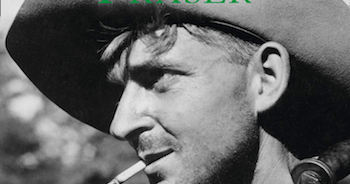


Quite so.It was a fine sunny morning when the news, in its garbled form, ran round the battalion, and if it changed the world, it didn’t change Nine Section. They sat on the floor of the basha, backs to the wall, supping chah [tea] and being sceptical. “Secret weapon” was an expression bandied about with cynical humour all through the war; Foshie’s socks and Grandarse’s flatulence, those were secret weapons, and super-bombs were the stuff of fantasy. I didn’t believe it, that first day, although from the talk at company H.Q. it was fairly clear that something big had happened, or was about to happen. And even when it was confirmed, and unheard of expressions like “atomic bomb” and “Hiroshima” (then pronounced Hirosheema) were bandied about, it all seemed very distant and unlikely. Three days after the first rumour, on the very day that the second bomb fell on Nagasaki, one of the battalion’s companies was duffying with a Jap force on the Sittang bank and killing 21 of them – that was the war, not what was happening hundreds of miles away. As Grandarse so sagely observed: “They want tae drop their fookin’ atoms on the Pegu Yomas, then we’ll git the bleedin’ war ower.” Even then, Nick wasn’t prepared to bet that we wouldn’t be going into Malaya with mules; we would all, he prophesied, get killed.
It took a week, as all the world knows now, for the Japanese government to call it a day, but even after the official surrender of August 14 there was no cease-fire along the Rangoon road; it was almost a fortnight before the Japs in the field started to come in, and the business of rounding up and disarming the remnants began, but by that time I was over the hills and far away, perspiring before a selection board at Chittagong, playing idiotic games of word association, trying to convince psychiatrists that I combined the qualities of Francis of Assisi and Genghiz Khan, that I knew which knife and fork to use, and “actually, sir, the reason I want to be an officer is, honestly, that I’m sure it’s how I can best serve the Army, if you know what I mean, sir.” “Quite so, corporal – now, when I say the word ‘rape’ what’s the first thought that comes to your mind?” “Sir? Sorry, sir, I didn’t quite catch that . . .”
But that was still in the future. The war ended in mid-August, and even before then Nine Section had decided that the fight, if not necessarily done, had reached a stage where celebration was permissible. I joined them in the makeshift canteen, quantities of beer were shifted, Forster sang “Cumberland Way” and “The Horn of the Hunter” in an excruciating nasal croak with his eyes closed, Wedge wept and was sick, Wattie passed out, Morton became bellicose because, he alleged, Forster had pinched his pint, Parker and Stanley separated them, and harmony of a sort was restored with a thunderous rendering of “John Peel”, all verses, from Denton Holme to Scratchmere Scar with Peel’s view-halloo awakening the dead – Cumbrians may be among the world’s worst vocalists, but they alone can sing that rousing anthem of pursuit as it should be sung, with a wild primitive violence that makes the Horst Wessel sound like a lullaby, Grandarse red-faced and roaring and Nick pounding the time and somehow managing to sing with his pipe clenched in his teeth.
Like everyone else, we were glad it was over, brought to a sudden, devastating stop by those two bombs that fell on Japan. We had no slightest thought of what it would mean for the future, or even what it meant at the time; we did not know what the immediate effect of those bombs had been on their targets, and we didn’t much care. We were of a generation to whom Coventry and the London Blitz and Clydebank and Liverpool and Plymouth were more than just names; our country had been hammered mercilessly from the sky, and so had Germany; we had seen the pictures of Belsen and of the frozen horror of the Russian front; part of our higher education had been devoted to techniques of killing and destruction; we were not going to lose sleep because the Japanese homeland had taken its turn. If anything, at the time, remembering the kind of war it had been, and the kind of people we, personally, had been up against, we probably felt that justice had been done. But it was of small importance when weighed against the glorious fact that the war was over at last.
There was certainly no moralising, no feeling at all of the guilt which some thinkers nowadays seem to want to attach to the bombing of Hiroshima and Nagasaki. And because so many myths have been carefully fostered about it, and so much emotion generated, all on one side, with no real thought for those most affected by it on the Allied side, I would like just to look at it, briefly, from our minority point of view. And not only ours, but perhaps yours, too.
Some years ago I heard a man denounce the nuclear bombing of Japan as an obscenity; it was monstrous, barbarous, and no civilised people could even have contemplated it; we should all be thoroughly ashamed of it.
I couldn’t argue with him, or deny the obscenity, monstrosity, and barbarism. I could only ask him questions, such as:
“Where were you when the war ended?”
“In Glasgow.”
“Will you answer a hypothetical question: if it were possible, would you give your life now, to restore one of the lives of Hiroshima?”
He wriggled a good deal, said it wasn’t relevant, or logical, or whatever, but in the end, to do him justice, he admitted that he wouldn’t.
So I asked him: “By what right, then, do you say that Allied lives should have been sacrificed to save the victims of Hiroshima? Because what you’re saying is that, while you’re not willing to give your life, Allied soldiers should have given theirs. Mine for one, possibly.”
It was a bit unfair, perhaps, if only because I am rather heavily built and he was an elderly philosopher and I was obviously much moved, which may have flustered him, because he was unwise enough to say that that was the point – we were soldiers, the bomb victims were civilians. I did not pursue the question whether the lives of your own soldiers should be sacrificed for the safety of enemy civilians, because if you get into that particular moral jungle you’ll never come out; but I did point out that we were, in fact, civilians, too – civilians in uniform, and could he understand our possible resentment that people whose lives and liberties we had been fighting to protect (him, in fact) should be ready to expend us for the sake of Japanese?
He was getting quite alarmed now, because I do have a tendency to raise my voice in debate. But he stuck to his guns and cried “Japanese women and children!”
I conceded this, and pointed out that I had three children – but if I’d gone down in Malaya they’d never have been born; they would, in fact, have been as effectively deprived of existence as the children of Nagasaki. Was he advocating that?
He pointed out, fairly, that I might not have gone down in Malaya, to which I (only too glad to escape from the argumentum ad hominem which I’d introduced, because it makes you sound like a right moaning “I-was-there” jungle-basher) retorted that someone would surely have bought his lot in Malaya, and how about his children?
He bolted, predictably, along the only escape route open to him – and a well-worn one it has become – by saying that the bombs were unnecessary because Japan was ready to surrender anyway, and it was only done because Truman wanted to use the thing to frighten the Russians, and all this talk that it would have cost 50,000 Allied lives to storm Japan was horse manure, because it would never have come to that.
“You think,” I said, “you hope. But you don’t know.”
Yes, he did, and cited authorities.
“All right,” I said. “Leave aside that I am arguably in a better position than you are to judge whether Jap was ready to surrender or not, at least at the sharp end, whatever Hirohito and Co were thinking – are you saying that the war would have ended on August 15 if the bombs hadn’t been dropped?”
“No, of course not. But not long after . . . a few weeks . . .”
“Months, maybe?”
“Possibly . . . not likely . . .”
“But at any rate, some Allied lives would have been lost, after August 15 – lives which in fact were saved by the bombs?” Not mine, because I’d been in India by then, and the war would have had to go on for several months for me to get involved again. I didn’t tell him that; it would just have confused the issue.
Yes, he admitted, some additional Allied lives would have been lost; he didn’t say they were expendable, but he plainly thought so.
“And that would have been all right with you? British, Indian, American, Australian, Chinese – my God, yes, even Russian – all right for them to die, but not the people of Hiroshima – or you?”
He said something about military casualties being inevitable in war (he was telling me!), but that the scale of Hiroshima, the devastation, the after-effects, the calculated immolation of a whole city’s population. . .
“Look,” I said, “I’m not arguing with you. I’m not necessarily disagreeing with you. I just wanted to know where you stood, and to mention some points which you may not have considered, and to have you ask yourself if you are really in a position, morally speaking, to say who should have died and who shouldn’t?”
“Well!” he said, looking aggrieved. “Where do you stand?”
“None of your goddam business,” I said, sweetly reasonable as always, “but wherever it is, or was, it’s somewhere you have never been, among people whom you wouldn’t understand.” Which was a bit over the score, but these armchair philosophers who live in their safe havens of the mind, and take their extensive moral views without ever really thinking, or exploring those unpleasant dark corners of debate which they don’t like to think are there – they can, as Grandarse would have said, get on my wick.
As to where I stand – oh, in so many different places. They change with time, and my view is coloured by many different considerations. These are some of them.
The dropping of the bombs was a hideous thing, and I do not wonder that some of those who bore a part in it have been haunted by it all their lives. If it was not barbaric, the word has no meaning.
I led Nine Section for a time; leading or not, I was part of it. They were my mates, and to them I was bound by ties of duty, loyalty, and honour. Now, take Nine Section as representing those Allied soldiers who would certainly have died if the bombs had not been dropped (and remember that Nine Section might well have been not representatives, but the men themselves). Could I say, yes, Grandarse or Nick or Forster were expendable, and should have died rather than the victims of Hiroshima? No, never. And that goes for every Indian, American, Australian, African, Chinese and other soldier whose life was on the line in August, 1945. So drop the bomb.
And it was not only their lives, as I pointed out to my antibomb disputant. To reduce it to a selfish, personal level . . . if the bombs had been withheld, and the war had continued on conventional lines, then even if I’d failed my board and gone with the battalion into Malaya, the odds are that I’d have survived: 4 to 1 actuarially speaking, on the section’s Burma fatalities. But I might have been that one, in which case my three children and six grandchildren would never have been born. And that, I’m afraid, is where all discussion of pros and cons evaporates and becomes meaningless, because for those nine lives I would pull the plug on the whole Japanese nation and never even blink. And so, I dare suggest, would you. And if you wouldn’t, you may be nearer to the divine than I am but you sure as hell aren’t fit to be parents or grandparents.
It comes to this, then, that I think the bombing was right? On those two counts, without a doubt. If it wasn’t, what were we fighting for? And then I have another thought.
You see, I have a feeling that if – and I know it’s an impossible if – but if, on that sunny August morning, Nine Section had known all that we know now of Hiroshima and Nagasaki, and could have been shown the effect of that bombing, and if some voice from on high had said: “There – that can end the war for you, if you want. But it doesn’t have to happen; the alternative is that the war, as you’ve known it, goes on to a normal victorious conclusion, which may take some time, and if the past is anything to go by, some of you won’t reach the end of the road. Anyway, Malaya’s down that way . . . it’s up to you”, I think I know what would have happened. They would have cried “Aw, fook that!” with one voice, and then they would have sat about, snarling, and lapsed into silence, and then someone would have said heavily, “Aye, weel,” and got to his feet, and been asked “W’eer th’ ‘ell you gan, then?” and given no reply, and at last the rest would have got up, too, gathering their gear with moaning and foul language and ill-tempered harking back to the long dirty bloody miles from the Imphal boxes to the Sittang Bend and the iniquity of having to do it again, slinging their rifles and bickering about who was to go on point, and “Ah’s aboot ’ed it, me!” and “You, ye bugger, ye’re knackered afower ye start, you!” and “We’ll a’ git killed!”, and then they would have been moving south. Because that is the kind of men they were. And that is why I have written this book.

Whether it was absolutely necessary to use the two atomic bombs is highly controversial. What many do not know is that Tibbets was preparing to drop a third bomb on Japan-he had received orders to proceed. Tibbets never revealed what was the target city. At this point in the war, America could produce about one atomic bomb per month.
There are good arguments on both sides of this issue.
General MacArthur used the Emperor as a means to govern occupied Japan. So to avoid countless deaths by fanatical Japanese resistance it was simply more expedient to use the Emperor as a figurehead. So the Americans did grant this condition to the Japanese. The planned invasion beach on the Japanese main island was fairly easy to deduce-there weren't many suitable sites. The Japanese heavily re-enforced this anticipated area. Some Japanese military officers were willing to accept surrender to end the war but not to the occupation of Japan. Peace feelers put out to the Soviets proved to be a failure as Stalin wanted territory held by the Japanese-ending war while he was winning wasn't an option.
Just prior to the scheduled radio broadcast of the Emperor announcing the surrender of Japan, there was an attempted coup by diehard junior officers which almost succeeded.
Stalin did invade the northern Japanese island chain, which Russia holds to this day.

Stalin already knew about the American atomic bomb program through his spy network-the first Russian bomb was a near-exact copy of the Fatman bomb. So the dropping of the two American atomic bombs was neither a surprise to Stalin nor was it a deterrent.



